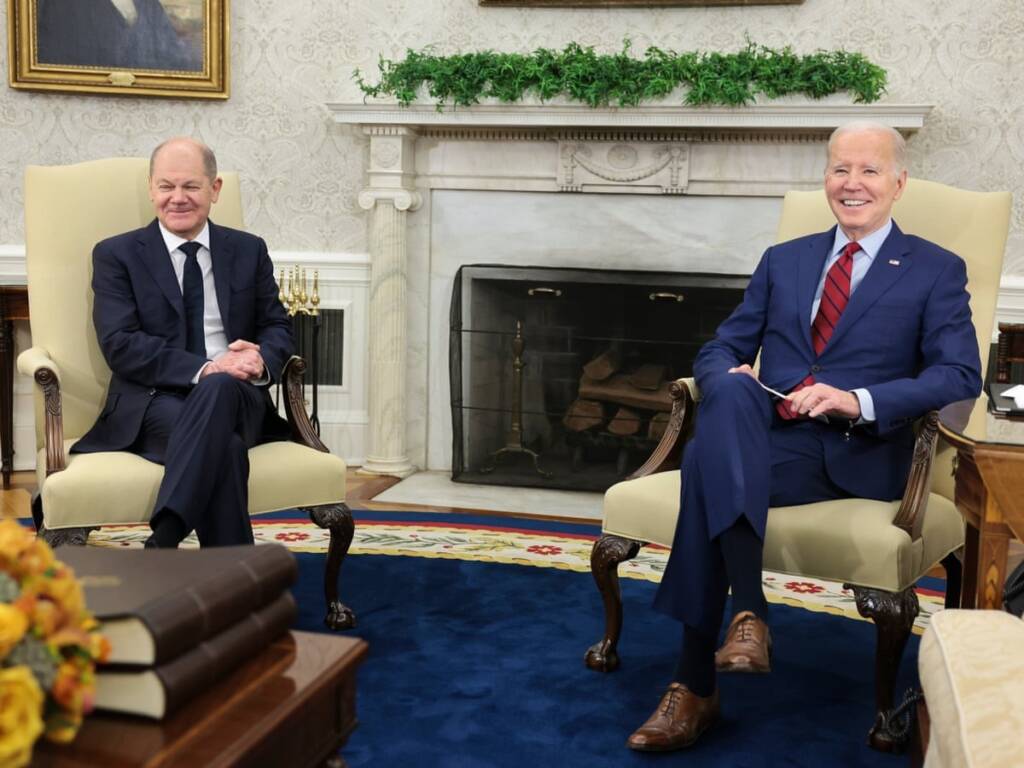The dynamics of transatlantic relations have experienced a notable shift, as exemplified by the evolving roles of the U.S. and Germany. Traditionally, American officials have undertaken diplomatic endeavors to encourage increased defense expenditures among European allies. This practice, often characterized by persuasion and occasional admonishment, has been a consistent feature over the decades.
However, a noteworthy reversal has occurred. Currently, European leaders, notably from Germany, find themselves in the position of urging their American counterparts, particularly lawmakers in Capitol Hill, to sustain unwavering support for European security. The pressing concern lies in whether Berlin will assume a leadership role, prompting other European nations and allies globally to step in and address the potential vacuum left by a receding United States.
Join us on Telegram: https://t.me/tfiglobal
German Chancellor Olaf Scholz recently conveyed a crucial message during his brief visit to the U.S. capital, “When it comes to Ukraine’s ability to defend itself, support from the United States is indispensable”, he said.
Scholz’s concern stems from the uncertainty surrounding America’s commitment to Europe, particularly regarding its role in sustaining the global order, which has been fundamental to Germany’s postwar success.
During his visit, Scholz adopted a persuasive tone, avoiding criticism, a style incongruent with his leadership. Germany, having previously miscalculated Russia’s actions and underinvested in defense, now finds a solid foundation and a compelling reason to seek U.S. involvement. The primary threat lies in Russia’s imperialist activities in Ukraine, posing a potential direct threat to NATO territory within three years, as estimated by Danish Minister of Defense Troels Lund Poulsen.
The ramifications extend beyond European security, impacting the United States as well. Since World War II, a shared understanding has prevailed that U.S. and European security are interconnected, emphasizing the importance of U.S. presence in Europe to prevent another global conflict. This understanding forms the bedrock of the North Atlantic Alliance, currently marking its 75th anniversary.
Read More: Gas-Gone Germany’s Economy takes a hit
Ensuring Russia’s failure in Ukraine is imperative, as its success would challenge established norms and jeopardize global stability. Chancellor Scholz emphasized this point during his Washington visit, asserting that a lack of continued U.S. support would undermine Ukraine’s self-defense, leading to a victory for Russia and losses for everyone, including the United States.
Scholz’s stance is fortified not only by compelling arguments but also by a significant policy shift. Germany, traditionally reliant on trade and interdependence with potential adversaries for security, has abandoned this notion. Notably, the country, previously importing over half of its gas from Russia, eliminated such imports entirely by June 2023, despite incurring substantial costs.
A pivotal moment occurred on Feb. 27, 2022, with Scholz’s announcement of Germany’s “Zeitenwende” or historic pivot. Acknowledging the importance of a robust defense for national security, he committed €100 billion to new equipment and pledged to meet NATO’s defense spending goal of 2 percent of GDP. Overcoming bureaucratic challenges, Germany is set to achieve this goal in the current year, actively contributing to NATO’s defense and deterrence efforts, including deploying a brigade in Lithuania next year.
Furthermore, Germany has emerged as Ukraine’s primary supporter in Europe. Demonstrating this commitment, Berlin has surpassed other nations in both military and economic aid to Ukraine. The over €17 billion in military support pledged by Germany through October 2023 (according to the most up-to-date data) exceeds a third of the U.S. commitment (€44 billion) and more than doubles that of Britain (€7 billion), establishing Germany as the third-largest contributor globally.
Read More: 7 reasons why Germany will be a failed state in the next 20 yrs.
In addition to crucial economic aid, both bilaterally and through the European Union, Germany’s support for Ukraine is commendable. Up until October, Germany contributed €38 billion in aid, representing well over half of the €71 billion spent by the U.S. This figure excludes the nearly €14 billion allocated for hosting Ukrainian refugees, further highlighting Germany’s substantial commitment.
While Germany is not alone in supporting Ukraine, its efforts stand out when considering aid as a percentage of GDP. Virtually every European nation, excluding Iceland and Switzerland, has contributed a higher share of support than the U.S. Currently, Germany’s share, approaching 0.9 percent, is three times that of the United States.
Despite these significant contributions, the U.S. debate on supporting Ukraine remains entrenched in domestic politics, potentially disregarding common-sense arguments and indisputable facts. However, the implications are more crucial for Europe, particularly Germany, which has assumed a central role in the region’s future security. The question arises: will Germany step up, leveraging its economic and political influence to lead others in Europe and beyond to fill the void that a retreating U.S. threatens to create?
